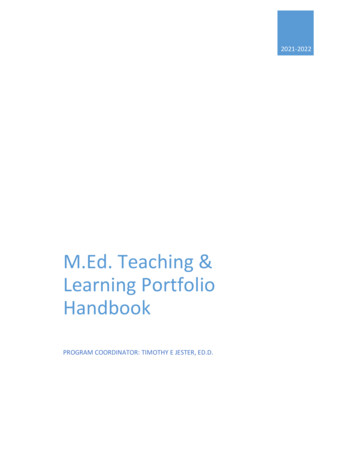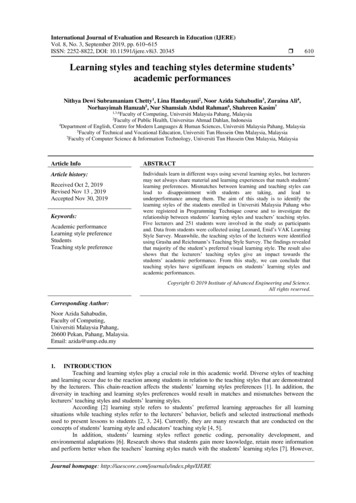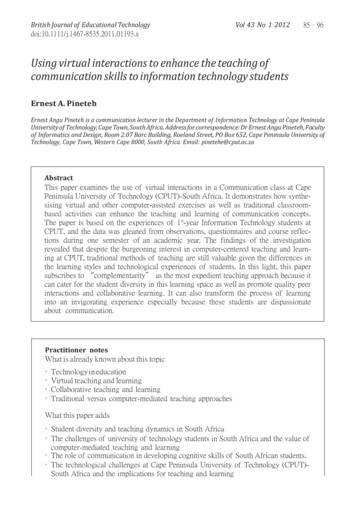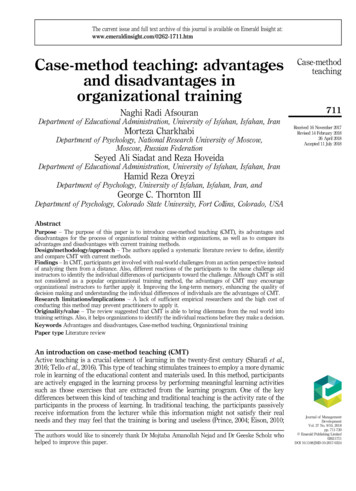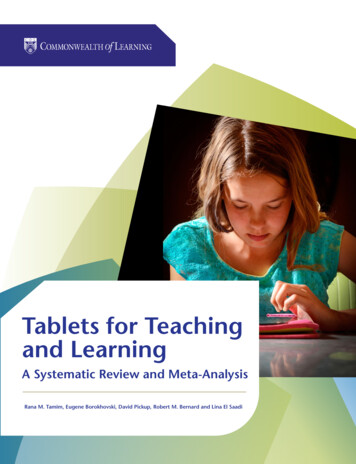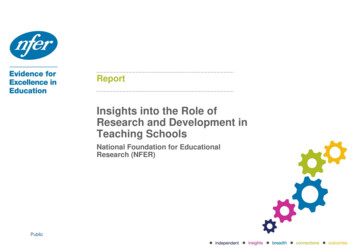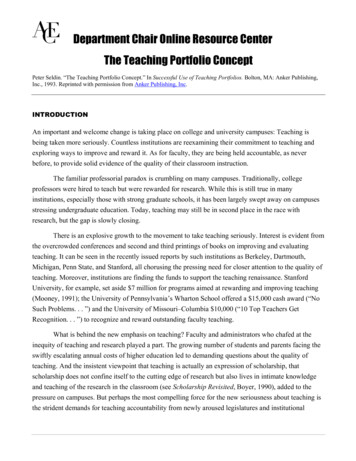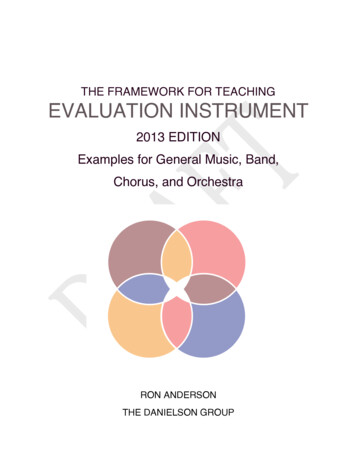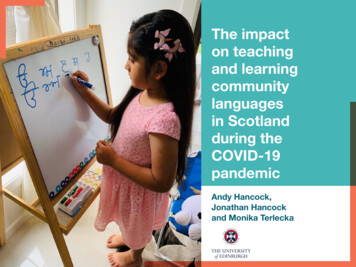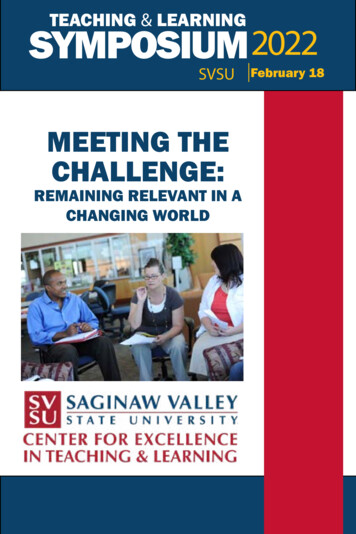
Transcription
TEACHING & LEARNINGSYMPOSIUM 2022SVSUMEETING THECHALLENGE:REMAINING RELEVANT IN ACHANGING WORLDFebruary 18
THE CENTERFOR EXCELLENCE INTEACHING & LEARNINGDawn Hinton, Ph.D.Erik Trump, Ph.D.Director,Center for Excellence in Teaching & LearningProfessor, Department of Political ScienceGabrielle Likavec, M.S. Instructional Designer,Center for Excellence in Teaching & LearningAnne Huebel, Ph.D.Online/Hybrid Support Specialist,Center for Excellence in Teaching & LearningJoseph Weaver, Ph.D. Associate Professor, Dept. of PsychologyCETL Teaching FellowSylvia Fromherz, Ph.D.Associate Professor, Dept. of BiologyCETL Teaching FellowDeb RickertOffice Coordinator,Center for Excellence in Teaching & LearningINNOVATECOLLABORATECONNECTelcome to the Center for Excellence in Teaching &Learning's (CETL’s) eighth Annual Teaching andLearning Symposium. The theme for this year’ssymposium is a reflection of our experience over the last couple ofyears, which will be remembered as the time that caused us to rethinkhow we offered instruction. Our theme “Meeting the Challenge:Remaining Relevant in a Changing World” represents thework that our faculty have done in meeting the challenge of aCOVID-19 educational milieu. We have watched as our colleagueshave adjusted their teaching methodologies and modalities to meetthe needs of a changing environment. At the same time, we haveresponded to the various social injustices that have occurred byrethinking how we present our discipline within each of ourclassrooms.During this year’s symposium we will recognize the various projectsundertaken by the 2021 Dow grant recipients, hear from ourinaugural Faculty Learning Communities, discuss ways that we cansupport our adjunct faculty, and engage in conversations with ourcolleagues about how to best reach our students. This year attendeeswill also participate in a Digital Adventure, working together to solvepuzzles, uncover clues, and crack codes in their quest to learn moreabout the Center for Excellence in Teaching and Learning.This year’s symposium seeks to celebrate the work that we have doneto make sure that we are remaining relevant in this swiftly changingenvironment. We look forward to collaborating with each of you aswe all work to improve our students’ experiences in the classroom.- The CETL Team01
PROGRAMWELCOMEDeb HuntleyOVERVIEW OF SYMPOSIUMDawn HintonDOW PROFESSOR AND DEPARTMENT INNOVATIONGRANT RECIPIENTSFacilitated by Joe WeaverSUPPORTING ADJUNCT FACULTYDavid SchneiderINTEGRATING CAREER PREPARATIONJim DwyerTITLE III AND DOW FACULTY LEARNING COMMUNITIESFacilitated by Gabrielle LikavecBREAKDISCUSSION GROUPSFacilitated by Anne HuebelUpcoming FLCsDow Professor and Department Innovation GrantsLessons Learned from the PandemicSupporting Adjunct FacultyDiversity and Inclusion in the ClassroomUPCOMING CETL PROGRAMS AND DEADLINESSylvia FromherzCLOSING REMARKSDawn Hinton03
Dow Professor GrantRecipientsFunding for these projects was provided by the Herbert H. and Grace A. DowEnhancement of Student Learning in ME 252Engineering Dynamics Course by Active LearningPedagogical DemonstrationFoundation.Advancing Engineering Ethics Education usingActive LearningRajani MuraleedharanAssociate Professor of Electrical and Computer EngineeringDepartment of Electrical & Computer EngineeringRajani Muraleedharan is an associate professor atSVSU. Rajani obtained her MS and PhD in Electricaland Computer Engineering at Syracuse University.Before joining SVSU, Rajani worked as an 3/4 Fulltime ECE assistant professor at Rowan University,a postdoctoral research associate at Universityof Rochester, and a research intern at MitsubishiElectric Research Lab, MA. Her research interestincludes wireless communications, computationalintelligence, robotics, mobile-cloud computing,information and network security.AbstractEthics is a crucial topic in any engineering program as today’s students aretomorrow’s leaders and innovators who are expected to behave in an ethicalmanner. Unlike technical skills, teaching engineering students to developethical decision-making skill is a challenge and require non-conventionalteaching methods. In this project, active learning strategies (role-playing) areused to teach ethics for electrical engineering students, so they understandethics violation and the moral responsibilities to seek justice. In this project,engineering students will research on current engineering ethics case studies,review the ethics code by National Society of Professional Engineers (NSPE),and Institute of Electrical and Electronic Engineers (IEEE) code of ethics andbring it to life by collaborating with theatre students to learn cross-disciplinaryskills such as skit development, performance, and filming. The project aimsat empowering students in any program to positively contribute to ethicalresponsibility by reevaluating their individual perceptions and embracing newperspectives to make moral judgements.CETL Teaching and Learning SymposiumAKM Monayem MazumderAssistant Professor of Mechanical EngineeringDepartment of Mechnaical EngineeringA K M Monayem H. Mazumder received his PhDfrom the University of Oklahoma. He has been aPostdoctoral Fellow at University of New Mexico. Heworked as a visiting assistant professor at LamarUniversity. Presently, he is working as an assistantprofessor at Saginaw Valley State University.AbstractThis project enhances student learning in a gateway engineering dynamicscourse by modifying the instructional design to incorporate hands-on learning activities. The project targets Mechanical Engineering (ME) undergraduatestudents, for whom ME 252 Engineering Dynamics is a required foundationalcourse. The project’s goal is to improve students’ understanding of engineeringdynamics principles, increase the pass rate in ME252, and better preparestudents for higher-level courses. The funds will be used to purchase and make/assemble pedagogical demonstration materials which students will manipulatein the classroom to solve problems and learn fundamental concepts. In addition,the Socrative app will be used to engage students in post-activity reflection andto analyze the impact of those activities on the students’ understanding level.It is anticipated that the use of these pedagogical demonstration materials willimprove student success. An analysis of student success data will be sharedwith the SVSU community and presented at a professional conference.05
Worked Examples Video Library to Impact StudentSkills in the General Chemistry Sequence2021 Digital Media and Composition InstituteMichael CooteKimberly LaceyAfter obtaining his BS (2004) and M.S. (2006) inchemistry, Dr. Michael Coote started at SVSU asan adjunct lecturer in the Chemistry Departmentin 2007. In 2009 he left to complete a Ph.D. atOakland University, returning as a full-time lecturer in2015 and appointed to Assistant Professor in 2019.Kim Lacey (she/her) is an Associate Professor ofEnglish and has been at SVSU since 2011. Dr.Lacey’s work has appeared in Rhetoric SocietyQuarterly, Configurations, Journal of Evolution andTechnology, and other journals. Her manuscript,Creative Futures: Robot Picassos, Fake Friends, andother Sneaky Ways Technology Acts Creatively, isunder contract with Lexington Books.Assistant Professor of ChemistryDepartment of ChemistryAdam WarhausenAssociate Professor of ChemistryDepartment of ChemistryAdam Warhausen, Associate Professor of Chemistry,joined SVSU in the summer of 2013 after receivinghis Ph.D. from the University of Oklahoma (2012)in inorganic chemistry. His research focuses onthe synthesis and characterization of new transitionmetal complexes and the evaluation of their redoxproperties utilizing cyclic voltammetry. He teachesGeneral Chemistry I and II lecture and lab courses,for which he and his colleagues have evaluatedchanges to the General Chemistry experience.Associate Professor of EnglishDepartment of EnglishAbstractI am requesting funding to support my attendance at the 2021 Digital Mediaand Composition Institute (DMAC). Attending DMAC supports my pedagogicaland research goals of interdisciplinary studies in the areas of digital media andcomposition. Rather than writing towards an imagined audience, as studentsoften do in typical composition classrooms, developing digital texts withvarious tools speaks directly to the emphasis on multimodal texts in the field ofcomposition. Based on what I learn at DMAC, I will create and implement newassignments in ENGL 111 and 212 and assist my colleagues, in and beyond mydepartment, do the same by creating workshops.AbstractA video library of short, specifically focused walk-throughs of frequently usedskills and calculations in general chemistry will be created to assist studentsin a step-by-step fashion. Because the videos are specific to a single problemtype or skill and short in duration (less than 5 minutes) they are more likely tobe useful to a student who has become stuck and just needs a gentle nudge tocontinue. With a voice-over accompanying the walk-through, the students willbe able to see in real-time as the example is worked and what the thinking isbehind each step in the process.CETL Teaching and Learning Symposium07
Supporting Student Success and Retention inECE 235 Circuit Theory by Creating an Archive ofVideotaped Problem Solving DemonstrationsMohammad KhanAssistant Professor of Electrical & Computer EngineeringDepartment of Electrical & Computer EngineeringI, M. Ashraf Khan, have earned my doctoral degreefrom University of Notre Dame. The area of focuswas microelectronics and microelectronic reliability.After graduation, I joined as a visiting AssistantProfessor in Electrical and Computer Engineering,ECE, department at Jackson State University.Since Fall 2019, I started serving as an AssistantProfessor in ECE department at Saginaw Valley StateUniversity.Yu ZouAssociate Professor of Electrical and Computer EngineeringDepartment of Electrical and Computer EngineeringAbstractYu Zou joined SVSU ECE department in 2012 andhas been teaching and conducting research inpower electronics area since then. As the instructorof Circuits I (ECE235) in Spring semester, Dr. Zou,in this project, is helping develop problem-solvingvideos as additional learning resources for ECEstudents.ECE235 Circuit Theory is a required freshman gate-keeper course in theElectrical and Computer Engineering department and is a cross-listed course forthe Mechanical Engineering and the Engineering and Technology Managementprograms. An understanding of circuit theory is crucial for the future success ofElectrical Engineering students, and it is important for ME and ETM students too.However, the students from all the programs face various degree of challengesmastering Circuit Theory, as both our experiences and research show. Ideally,students learn various techniques to solve circuital problems; it is especiallyimportant that they develop the capability to decide which technique will bemore efficient or appropriate for a given circuital problem. The goal of thisproject is to support student success and retention in ECE235 by creating anarchive of videotaped problem solving demonstrations. Since the instructorsusually present and explain the problem solutions in the lectures, a student willbe hired in this project to develop the proposed demonstration videos to providefuture students with students’ angle of understandings. The expected outcomeis that this resource will, in the long run, help students learn multiple waysto understand, explain and solve problems, thus fostering their success andimprove the ECE program retention rate.CETL Teaching and Learning SymposiumDepartment GrantRecipientsPhysics Lab Curriculum Reform for FlexibleInstruction Targeting SkillsDepartment of PhysicsChris NakamuraMarian ShihKavindya SenanayakeMatthew VannetteAbstractThe department has long agreed that our introductory laboratory curriculumneeds revision to meet our pedagogical goals. Recently, the AmericanAssociation of Physics Teachers (AAPT) recommended labs focus ondevelopment of experimental and critical thinking skills over physics content.This emphasis is in line with our goals. Our innovative COVID-19 response,achieved without additional funds, produced labs amenable to fully remoteinstruction. Our flexible, kit-based labs allow students to work on-campus or athome, or a blend of both. They also present a shift towards emphasis on skillsover content. This achievement is just the beginning of what we can and shoulddo. The requested funds will support our introductory lab curriculum redesignacross the 3 introductory physics levels. Our goal is three sets of flexibleexperiments, written instructional materials, video support and course designsthat we can use on-campus or online to provide the best possible introductoryphysics laboratory instruction.09
Experiential Learning with Community Service:Creating a Community Research LabDepartment of SociologyWarren FincherRosina HassounAbstractPrompted by an external review, the department wishes to establish an ongoingresearch forum – a “community research lab” — that will link local nonprofitsin need of research assistance with faculty and students in the SociologyDepartment. We believe that this will be beneficial both to the communitypartners by providing them with needed research resources and to mid-programand advanced sociology students, who stand to gain practical research skillsand consequently bolster their graduate school and employment prospects.As this program is only getting started, awarded funds will help establish theresearch lab as a community resource. The goals for the first year includecompleting a research project for a local community group (qualitative and/orquantitative in nature), involving at least five sociology majors or minors, from theearly stages of the project formation through to delivery of final research results.Open Education Resource(OER) Grant RecipientsFunding for these programs were provided by a Strengthening Institutions Program, Title III, from theU. S. Department of Education awarded to Saginaw Valley State University 2017-2022.Grace McClurkinAssistant Professor of Mathematical ScienceExtend, FLC MemberGrace McClurkin is an Assistant Professor ofMathematics. Her work with CETL focuses oncreating OER for General Education Statisticscourses, specifically a collection of note-takingguides, videos, and associated quizzes. Morebroadly, she is interested in using active learningand alternative assessment to foster students’mathematical identity.OER StatisticsThis project focuses on exending the work done in a previous OER grant, bycreating OER associated with several topics that were not addressed in theoriginal course design, specifically topics surrounding scatterplots and paireddata analysis. The OER will be compiled and added to the shared courseon Canvas Commons course, which is shared with the university for otherinstructors to use and incorporate into their courses at their discretion. Thetopics addressed in the new sections created with the support of the extensiongrant will allow more faculty to utilize the OER by providing broader contentcoverage, thus allowing them to more fully adapt the materials to their courseobjectives.Monika DixProfessor of Modern Foreign LanguagesAdoptMonika Dix is Professor of Japanese language,literature and culture and Chair in the Department ofModern Foreign Languages at Saginaw Valley StateUniversity. She has published various articles andbook chapters on Japanese language and literature,both in English and Japanese.ENG/MFL 205 & GER 111/112This project will support adopting and curating existing OER materials across 3classes: MFL 205, GER 111, and GER 112. These efforts will allow the coursesto be updated, while decreasing the cost to students and potentially boostingenrollments. Because open materials are fully revisable and remixable, they canbe customized to fit the way an instructor wants to teach a course.CETL Teaching and Learning Symposium11
James HittKavindya Senanayake"Hired in 2009, it has been a wonderful ride so far.I was hired, who really knows why, because of myexperience with medical ethics. The bulk of myteaching, writing, and community work surroundsbioethics. When I teach well, I learn too. Not somuch for death.Kavi Senanayake is an assistant professor ofPhysics. She earned her bachelor’s degree from theUniversity of Peradeniya in Sri Lanka and afterwardpursued both Master’s in Science and Ph.D. fromWayne State University. Her primary teaching focusis learning new teaching tools to introduce activelearning sessions in class.Assistant Professor of PhysicsAdopt, FLC MemberAssociate Professor of PhilosophyCreate & Share, FLC MemberAbstractAbstractThe goal of this project is to create materials in the language and framework of theprofession which address applied health care ethics. This will allow for new formativeand summative assesments which go beyond the traditional CANVAS quiz andpromote critical thinking in students.Kellie KonsorAssociate Professor of EconomicsAdapt, FLC MemberKellie Konsor has been teaching at SVSU since2016 and holds a Ph.D. in Economics from PurdueUniversity. She teaches introductory economicsand statistics courses where she uses simulationsand experiments to illustrate difficult concepts.AbstractMy goal for this project is to reduce the financial strain for students, enhancestudent engagement while increasing instructional flexibility. By incorporatingOER I am able to reduce student cost and further explore experiential learningspecific to my course objectives.In this project I will design and develop interactive group and individual activitiesthat align with the topics covered in the General Physics 1 course using PHETsimulations.Bob LaneProfessor of Political ScienceAdoptI have wanted to be a teacher since I was thirteen,and upon graduating from the U of NorthernColorado in 1976, for nine years I taught 6-12 gradeEnglish/Social Studies. Upon concluding the PoliticalScience Ph.D program at the UW-Madison campus,I came to SVSU in the Fall of 1991.AbstractUpdating the course I have taught for 30 years to incorporate OER allows me toprecisely tailor the course content to what is best suited for my students whilereducing the cost. I will utilize OER textbooks along with current film and newsstory to engage my students in active learning.Helen Raica-KlotzEmily Beard-BohnLecturer, Department of EnglishAdaptAssociate Professor of EnglishAdapt, FLC MemberHelen Raica-Klotz is a lecturer in the Englishdepartment, where she teaches composition andgeneral education literature coures. Her pastroles include the SVSU Writing Center Director,Community Writing Center Director, and SaginawBay Writing Project Director.Emily Beard-Bohn is an Associate Professor in theEnglish Dept. She has taught at SVSU for 11 years.She teaches First Year Writing and English 212 thatfocuses on censorship and fake news. She alsoteaches for the Honors program.AbstractI will expand the use of OER in my course by incorporating additionalsupplemental materials with class discussion on the issues/themes in currenttimes.CETL Teaching and Learning SymposiumAbstractI will be incorporating free and open educational resources into my ENG 212course on the immigrant experience. These resources will allow my students toaccess a more robust selection of materials.13
Travis PashakJulie KeilTravis J. Pashak is a clinical psychologist in theDepartment of Psychology, currently serving asdepartment chair. He teaches courses ranging fromintroductory psych to advanced undergraduateseminars on mental health conceptualization,assessment, and treatment. He is interested in OERresources for their collaborative nature and studentcost-savings.Julie Keil is an associate professor who teachespolitical science, runs the SVSU moot court programand is the prelaw adviser. She is deeply involved inOER projects and has written an OER textbook onworld politics, several world politics articles and is amember of the OER faculty learning community.Associate Professor of Political ScienceFLC MemberAssociate Professor of PsychologyAdoptAbstractIn this project I will do a overhaul of my PSYC-100 General Psychology courseto use OER materials rather than relying on a traditional textbook. I anticipateteaching 2 sections of General Psychology per year with the potential to impact100-120 students. This will allow me to reduce costs to students and also revisemy instruction away from a traditional textbook.Katherine Cottrell-DonahueLecturer of BiologyAdopt, Create & ShareKatie Cottrell-Donahue is a lecturer in theDepartment of Biology at SVSU. She received herBachelor's and Master's of Science Degrees fromCentral Michigan University.BIOL 105A & BIO 105CThis project incoporates Open Educational Resources into 2 classes: Biol 105 A& 105 C. Biol 105A has traditional topic coverage and large enrollment makingit ideal to implement an existing OER text to provide financial relief to students.In 105C, materials will be created and/or curated to provide the necessaryscience in an engaging, level appropriate way which helps students realizethe importance of science in their every day life. These changes complimentprevious efforts to create Open Education Resources labs to reduce the cost ofmaterial to students while aligning instruction more closely to course objectives.Joshua MikeAssistant Professor of Mathematical SciencesFLC MemberJoshua Mike is an assistant professor ofMathematics at SVSU. His research seeksto develop new data science methods usingtopological tools. He is working this semester tocreate an OER-based, active-learning centereddiscrete mathematics course which emphasizes therelationships between formal logic, set theory, andproof.Tommy WedgeAssistant Professor of TheatreFLC MemberTommy Wedge, Assistant Professor of Theatre,has been active in teaching, directing, and stagecombat. He is the recipient of three Open EducationResource Grants. His current creative project isdirecting Caryl Churchill’s play Top Girls which runsApril 6-10 at SVSU.Funding for these programs were provided by a Strengthening Institutions Program, Title III, from theU. S. Department of Education awarded to Saginaw Valley State University 2017-2022.CETL Teaching and Learning Symposium15
Dow Senior/Mid-CareerFaculty LearningCommunityStacie KruppAssociate Professor of AccountingStacie Krupp is an Associate Professor ofAccounting in the Accounting, Law & FinanceDepartment of SVSU. She teaches accountingand tax courses with an emphasis on experientiallearning activities to prepare students for theaccounting profession. Prior to coming to SVSU,Ms. Krupp worked in public accounting for over 20years as a tax specialist. She is a certified publicaccountant and earned her Masters in Taxation fromthe University of Tulsa.Funding for these projects was provided by the Herbert H. and Grace A. Dow Foundation.Sheruni RatnabalasuriarAssociate Professor of Criminal JusticeSher Ratnabalasuriar is an Associate Professor inthe Department of Criminal Justice. Her teachingand research interests focus on justice, conflictresolution, active listening skills in inter/intra-groupdialogues, as well as exploring popular culturedepictions of justice concepts in mediums such asvideo games and social media.Warren FincherAssociate Professor of SociologyJulie LynchAssociate Professor of PsychologyJulie Lynch has been a faculty member in theSVSU Psychology Department since 2002. Shespecializes in educational and developmentalpsychology, with research focusing on thedevelopment of reading and writing skills. Sheenjoys mentoring students as they explorepsychological research and career paths.Warren Fincher is an Associate Professor ofSociology who also teaches in Gender Studies,Leadership & Service, and the Honors program. Heemphasizes experiential learning in his classes withreal-world social research, historical simulations,creative design projects, and study abroadadventures.Kenneth JollyProfessor of HistoryKenneth Jolly is a Professor of History and theCoordinator for the Black Studies program at SVSU.His research examines Black Liberation movementsand he teaches courses in Black Studies, AfricanAmerican History, the Black Power and Civil RightsMovements, the History of the African Diaspora, andU.S. History.CETL Teaching and Learning SymposiumJennifer ChaytorAssociate Professor of ChemistryKimberly LaceyJennifer Chaytor is a Professor of Chemistry andhas been teaching at SVSU since 2012. Her mainteaching responsibilities are organic chemistrylectures and laboratories and a biochemistrysurvey course. Jennifer has developed an activeundergraduate research program at SVSU studyingboth synthetic bioorganic chemistry and chemistryeducation.Associate Professor of EnglishKim Lacey (she/her) is an Associate Professor ofEnglish and has been at SVSU since 2011. Dr.Lacey’s work has appeared in Rhetoric SocietyQuarterly, Configurations, Journal of Evolution andTechnology, and other journals. Her manuscript,Creative Futures: Robot Picassos, Fake Friends, andother Sneaky Ways Technology Acts Creatively, isunder contract with Lexington Books.17
Veronika DrakeCatherine MacomberVeronika Drake is an Associate Professor ofEnglish. She loves all things language and teacheslinguistics courses, trying to raise students’awareness about linguistic bias and discrimination.Her research focusses on linguistic formats such asor-final questions (Are you gonna go out or.) andtheir interactional functions.Catherine A. Macomber is a Licensed Social Workerwith a PhD and Master’s degree in Social Work anda Certificate in Public Health from Michigan StateUniversity. She has expertise in interprofessionalethics, curriculum design, research, and policy, andhas used this with Federal and State grant fundedprograms.Associate Professor of EnglishAssociate Professor of Social WorkGary LangeSherrin FrancesProfessor of BiologyProfessor of EnglishSherrin Frances is Professor of English at SaginawValley State University in Michigan where sheteaches rhetoric and writing courses. Her researchfocuses on outsider libraries and the material cultureof the book. Her book Libraries amid Protest: Books,Organizing, and Global Activism appeared in 2020.Shaun BangertProfessor of ArtGary M. Lange is a Professor in the Department ofBiology. He has been a member of the Departmentfor 27 years. He is a physiologist specializing inDevelopmental Neuroendocrinology. His researchexplores the effects of endocrine disruptingpollutants in the environment on the growth,development, and physiology of organisms. Hiswork with the FLC includes designing a semesterlong laboratory project for his DevelopmentalBiology class to have students design, conduct, andreport on an individual research project.Shaun Bangert is a Professor of Art and Chair of theArt Department at SVSU. She has a BFA from SienaHeights University, and an MFA from the Universityof Michigan. She presently teaches courses inGraphic Design and Art History.Ranjana DuttaProfessor of PsychologyRanjana Dutta is a Professor of Psychology at SVSU.She has taught courses in cultural, lifespan, andadult psychology and nonexperimental methods.She has received the Landee Award for Excellencein Teaching and the House Family Award for TeacherImpact. She is always seeking to better engagestudents in class and research.David RzeszutekProfessor of TheatreDavid Rzeszutek, Theatre Professor, has beenteaching at SVSU since 2009. He is currently theChair of the Theatre Department, and has directedapproximately 25 plays at the university. His primaryteaching specialty is acting for the stage.CETL Teaching and Learning SymposiumStephanie BrouetProfessor of ChemistryStephanie Brouet is a professor in the departmentof chemistry, having joined in 2010. She previouslygraduated from the University of Michigan-Dearbornin 2001 and Wayne State University in 2006. Shemainly teaches organic chemistry and is conductinga project for FLC about plastics and polymers.19
FACULTY FRIDAYW O R K S H O PM. Patricia CavanaughProfessor of EnglishM. Patricia Cavanaugh is a professor in the EnglishDepartment and has been at SVSU for just overtwenty years. She has received the Braun Awardfor Research, the Landee Award for Teaching,and several Undergraduate Research Awards.She has also received two Dow Visiting ArtistsGrants, the Innovative Teaching with Writing Awardand last year was awarded a National EducationAssociation Grant. She currently holds a CommunityEngagement Grant.“Linguistic Justice:Black Language, Literacy,Identity & Pedagogy”DR. APRIL BAKER-BELLDaniel Gates1-2 p.m. Friday, March 25 Emeriti RoomAssociate Professor of EnglishIn this workshop, faculty will have an opportunity toengage in more intimate conversations about AntiBlack Linguistic Racism and how they can implementAntiracist Language Pedagogies in their respectivecourses. Participants will also have opportunities to askspecific questions about their teaching philosophiesof language, language policies, curriculum, practices,syllabi, writing assignments, etc. Baker-Bell will sharesample syllabi, assignments, and activities.Dan Gates, associate professor of English, mostlyteaches courses in literature, with an emphasis onShakespeare, other early modern writers, and theadaptation of literature to film.Co-sponsored by theDow Visiting Scholars & ArtistsProgram and the Center forExcellence in Teaching & LearningTo participate virtually in thisworkshop, register atsvsu.edu/workshops.For more information on the workshop,contact CETL at cetl@svsu.edu.Funding for these projects was provided by the Herbert H. and Grace A. Dow Foundation.CETL Teaching and Learning SymposiumSaginaw Valley State University is committed to providing work andlearning opportunities without regard to age, color, disability, genderidentity, genetic information, height, marital status, national origin, r
Associate Professor of Electrical and Computer Engineering Department of Electrical & Computer Engineering Rajani Muraleedharan is an associate professor at SVSU. Rajani obtained her MS and PhD in Electrical and Computer Engineering at Syracuse University. Before joining SVSU, Rajani worked as an 3/4 Full-time ECE assistant professor at Rowan .
